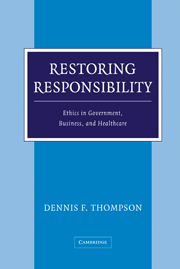Book contents
- Frontmatter
- Contents
- Acknowledgments
- Restoring Responsibility
- Introduction: The Need for Institutional Responsibility
- PART I DEMANDS OF INSTITUTIONAL POLITICS
- PART II VARIETIES OF INSTITUTIONAL FAILURE
- 6 Democratic Secrecy
- 7 Mediated Corruption
- 8 Election Time
- 9 Hypocrisy and Democracy
- 10 Private Life and Public Office
- Part III EXTENSIONS OF INSTITUTIONAL RESPONSIBILITY
- Credits
- Index
8 - Election Time
Published online by Cambridge University Press: 29 January 2010
- Frontmatter
- Contents
- Acknowledgments
- Restoring Responsibility
- Introduction: The Need for Institutional Responsibility
- PART I DEMANDS OF INSTITUTIONAL POLITICS
- PART II VARIETIES OF INSTITUTIONAL FAILURE
- 6 Democratic Secrecy
- 7 Mediated Corruption
- 8 Election Time
- 9 Hypocrisy and Democracy
- 10 Private Life and Public Office
- Part III EXTENSIONS OF INSTITUTIONAL RESPONSIBILITY
- Credits
- Index
Summary
An election marks a moment of politics – a discontinuous phase in a continuous process. The electoral moment can be specified by three temporal properties: periodicity (the intervals at which citizens vote); simultaneity (the range of time in which citizens vote); and finality (the extent to which the result of their votes is conclusive until the next election). The temporal properties are so familiar that they are usually taken for granted, but the way they structure the electoral process has significant theoretical and practical implications that have not been sufficiently appreciated.
The temporal properties are grounded in basic values shared by most conceptions of democracy. All three support popular sovereignty – the capacity of majorities to control government – in different but related ways. Because elections take place periodically, current majorities can overcome the dead hand of past majorities. To the extent that voting takes place simultaneously, elections express the will of a determinate majority rather than the preferences of a series of different majorities. Because elections produce final results, they legitimate the authority of a current majority until the next election. Other democratic values, such as fairness and civic engagement, are also strengthened to the extent that the electoral process realizes these temporal properties.
The temporal properties come in different combinations and take on different values in different systems. In the United States, citizens vote at regular intervals (more regular than in parliamentary systems), mostly all on the same day for any given election, and with conclusive results that are not normally reversible until the next election.
- Type
- Chapter
- Information
- Restoring ResponsibilityEthics in Government, Business, and Healthcare, pp. 174 - 208Publisher: Cambridge University PressPrint publication year: 2004



